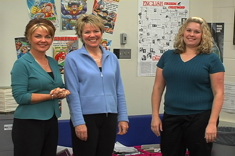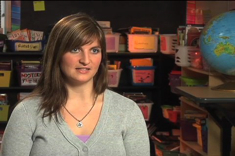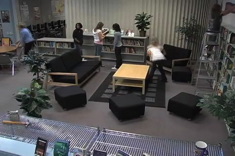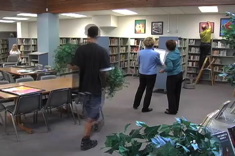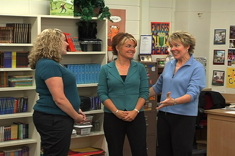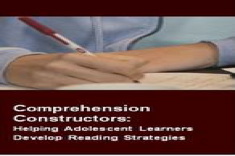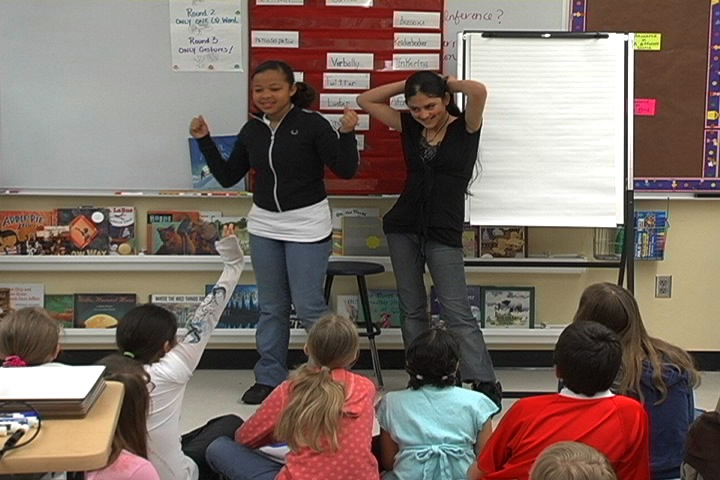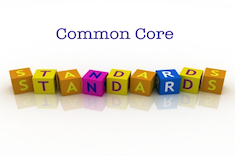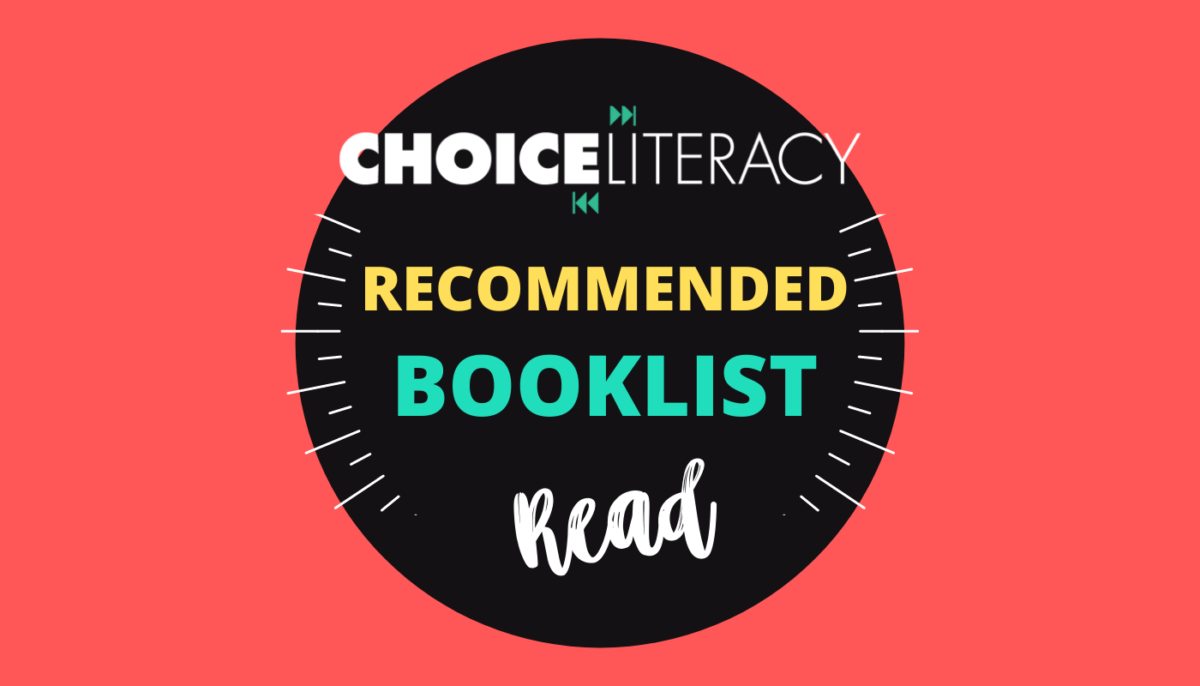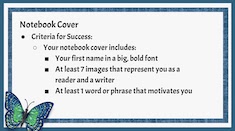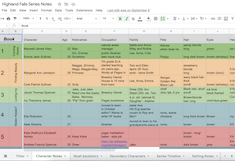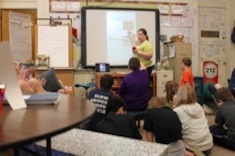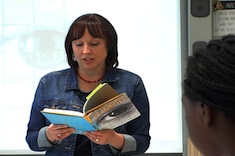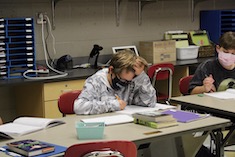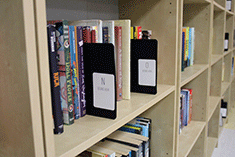8th
Latest Content
Middle School Classroom Makeover Part I
In this first of a three-part video series, “The Sisters” (Gail Boushey and Joan Moser) help 7th grade teacher Erin declutter and rearrange her classroom.
Quick Take: Advice from Katie Doherty on Starting a Middle School Reading Workshop
In this one-minute quick take video, Katie Doherty has advice for middle school teachers who are thinking of launching a reading workshop in their classrooms.
Middle School Library Makeover Part I
In this first of a two-part video series, “The Sisters” (Joan Moser and Gail Boushey) work with students, a librarian, and a principal to makeover a middle-school library. This first installment features the creation of a “cozy area” and new book browsing displays.
Middle School Library Makeover Part II: Stacks and Recap
The Sisters (Gail Boushey and Joan Moser) collaborate with a middle school librarian, principal, and team of students to makeover the school library. In this final segment of the series, they redo the stacks and meeting area, and then talk with students about the transformation of the entire library.
Middle School Classroom Makeover Part III
In this third installment of a three-part video series, “The Sisters” (Gail Boushey and Joan Moser) help 7th grade teacher Erin declutter and rearrange her classroom. This installment focuses on the challenges of classrooms with very little storage space.
Middle School Classroom Makeover Part II
In this second of a three-part video series, “The Sisters” (Gail Boushey and Joan Moser) help seventh-grade teacher Erin declutter and rearrange the media area of the classroom, creating a cozy library space.
Designing Comprehension Constructors: Helping Adolescent Learners Develop Reading Strategies (E-GUIDE)
Comprehension constructors are a terrific tool for helping teens record their understanding.
The Read-Around: Raising Writers
If there was a centerpiece to teaching writing that also brought students closer together, wouldn't you want to know about it? Read on about the Read-Around.
Let’s Get Some Attitude
Shirl McPhillips recalls a junior high experience that promoted serious "attitude" and an uproar among her peers.
Common Core Conversations: Increasing Argumentative Writing
Teachers continue to puzzle over and sort through the terminology in the Common Core related to opinion and persuasive writing. Amanda Adrian and Heather Rader consider terms and teaching strategies.
Choosing Books in Verse
Tara Barnett and Kate Mills offer tips and a booklist to position students to read novels in verse.
The Hermit Crab Essay: Finding a Shell to Share a Vulnerable Story
Gretchen Schroeder introduced the hermit crab essay as a creative nonfiction genre to her high school students. What began as an intriguing writing invitation led to realizing that students want to process these events through writing and that the hermit crab essay gives them a way to do so that is less daunting than just a blank page.
Setting Middle School Readers Up for Success
Tara Barnett and Kate Mills share ways to set up middle school readers for a successful independent reading life. Download two reading reflections to help students pause and consider where they are and where they want to go as readers.
Criteria for Success
Jen Vincent shares how to create a Criteria of Success to clearly define expectations for assignments and give students independence in self-assessment.
Using Fiction Writing to Change Attitudes About Writing
Katherine Sokolowski encourages teachers to take time for students to individualize the writing process and enjoy fiction writing by engaging in National Novel Writing Month. Download the story bible as a place for students to plan their stories.
Using 9/11 Research to Build Community and Writing Process
Katherine Sokolowski gives space for students to research and share their learning about 9/11 in order to build a community of writers, as well as nourish the research and writing process.
Strategic Seating
Mark Levine finds that good seating design in middle school isn’t just about where you place furniture—it’s about negotiating with students.
Middle-Grade Mental Health Booklist
Leigh Anne Eck shares an important booklist for middle-grade readers on mental health topics and with characters navigating mental health struggles.
Moving from Whole-Class Texts to Independent Reading: Characterization
Gretchen Schroeder offers a starting point to help her high school students prepare to write an in-depth character analysis essay.
Overcoming: Helping Students Process Covid Feelings
Julie Cox reminds us that for many students, the loneliness and fear of COVID years clings like smoke, and they don’t always have the language to talk about it. While we have worked hard at helping students reclaim content knowledge, we must also help them express and process feelings they might not know how to recognize.
Giving Writers What They Need
Tara Barnett and Kate Mills are inspired by their own writing retreat experience to give students exactly what they need to thrive as writers. Take their advice to help writers thrive in your classroom, too.
Quick Take: Special Library Shelves
Christy Rush-Levine shares a few special shelves in her classroom library.
Using Skype in the Classroom
Katherine Sokolowski has suggestions for Skype use in classrooms, covering everything from student etiquette to special events.
Browse Content By
Type
Category
- Assessment Tools
- Big Fresh Archives
- Booklists
- Choice Numeracy
- Classroom Design
- Common Core
- Community Building
- Conferring
- Content Literacy
- Digital Literacy
- English Language Learners
- Equity
- Family Relations
- Free Samples
- Guiding Groups
- Leadership
- Literacy Coaches
- Mentor Texts
- Minilessons
- New Teacher Mentors
- Podcasts
- Poetry
- Quote Collections
- Reading Strategies
- Self Care
- Struggling and Striving Learners
- Talking and Listening
- Teacher Study Groups
- Teaching Reading
- Teaching Writing
- Word Study and Vocabulary
Author
- Melissa Quimby
- Nawal Qarooni
- Gwen Blumberg
- Julie Cox
- The Lead Learners
- Hannah Tills
- Josie Stewart
- Ruth Metcalfe
- Mallory Messenger
- Becca Burk
- Jodie Bailey
- Vivian Chen
- Mary Brower
- Tiffany Abbott Fuller
- Stephanie Affinito
- Ruth Ayres
- Leigh Anne Eck
- Heather Fisher
- Shari Frost
- Julie Johnson
- Suzy Kaback
- Gigi McAllister
- Shirl McPhillips
- Melanie Meehan
- Cathy Mere
- Debbie Miller
- Tara Barnett and Kate Mills
- Tammy Mulligan
- Dana Murphy
- Bitsy Parks
- David Pittman
- Brenda Power
- Heather Rader
- Matt Renwick
- Mandy Robek
- Christy Rush-Levine
- Gretchen Schroeder
- Jen Schwanke
- Brian Sepe
- Katherine Sokolowski
- Stella Villalba
- Jennifer Vincent
Grade Level
Choice Literacy Membership
Articles
Get full access to all Choice Literacy article content
Videos
Get full access to all Choice Literacy video content
Courses
Access Choice Literacy course curriculum and training

